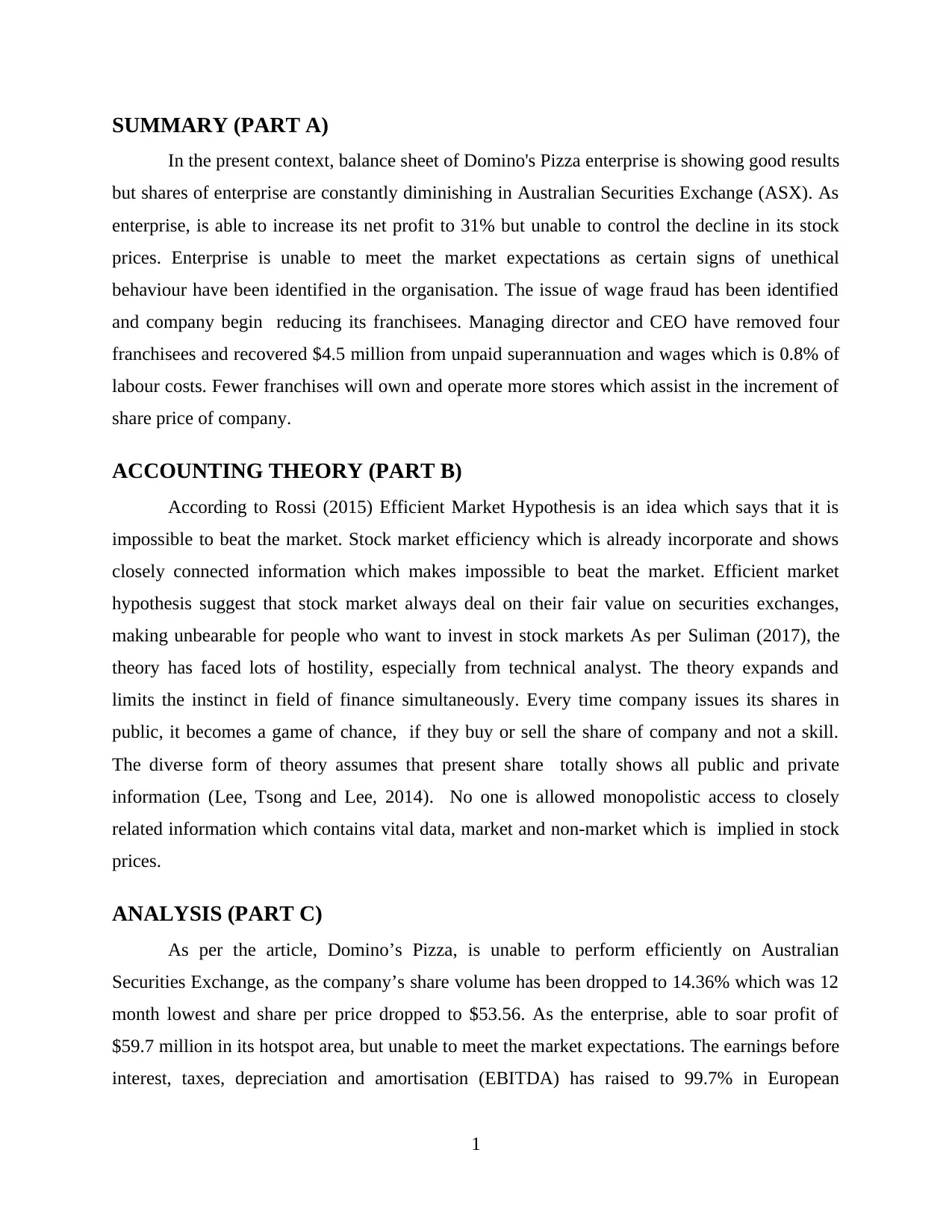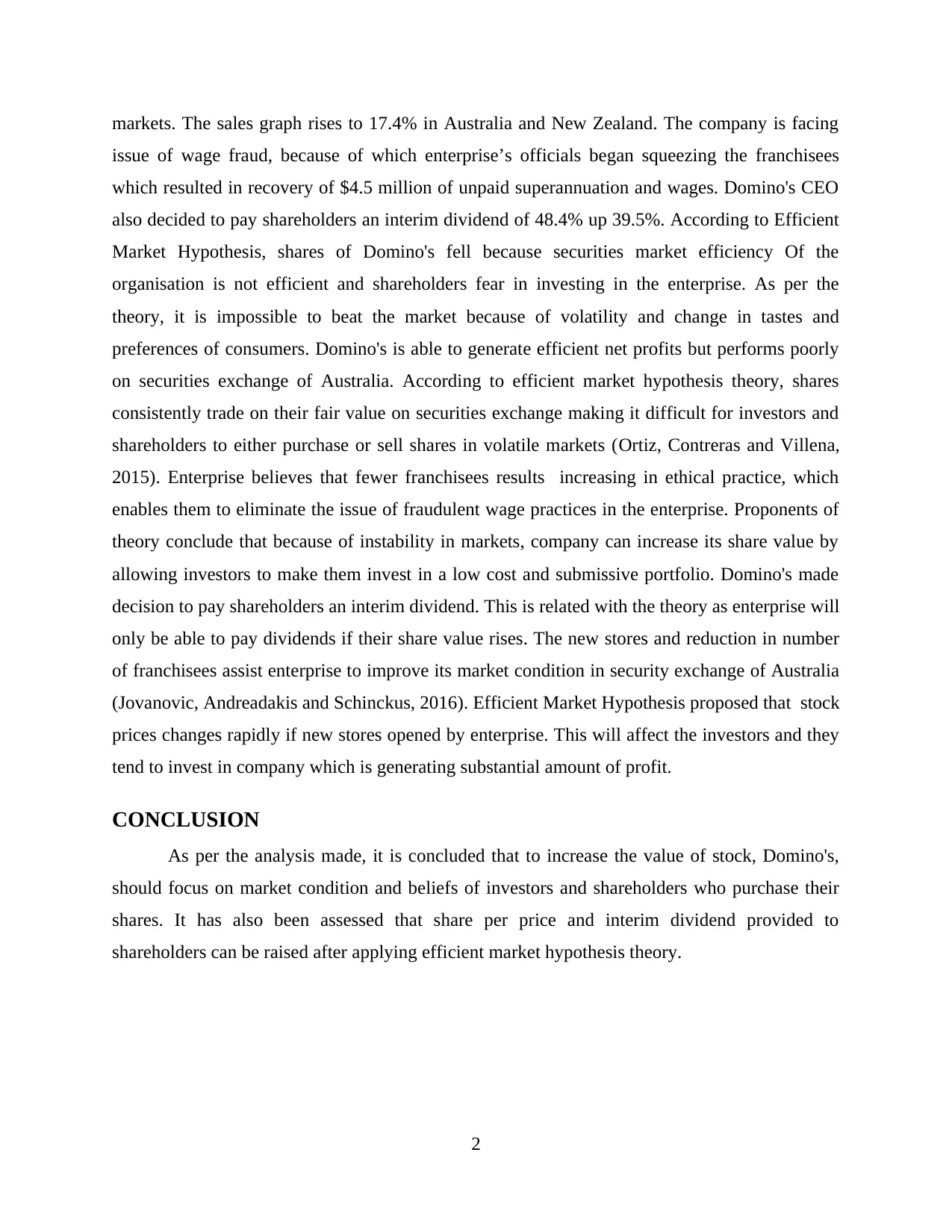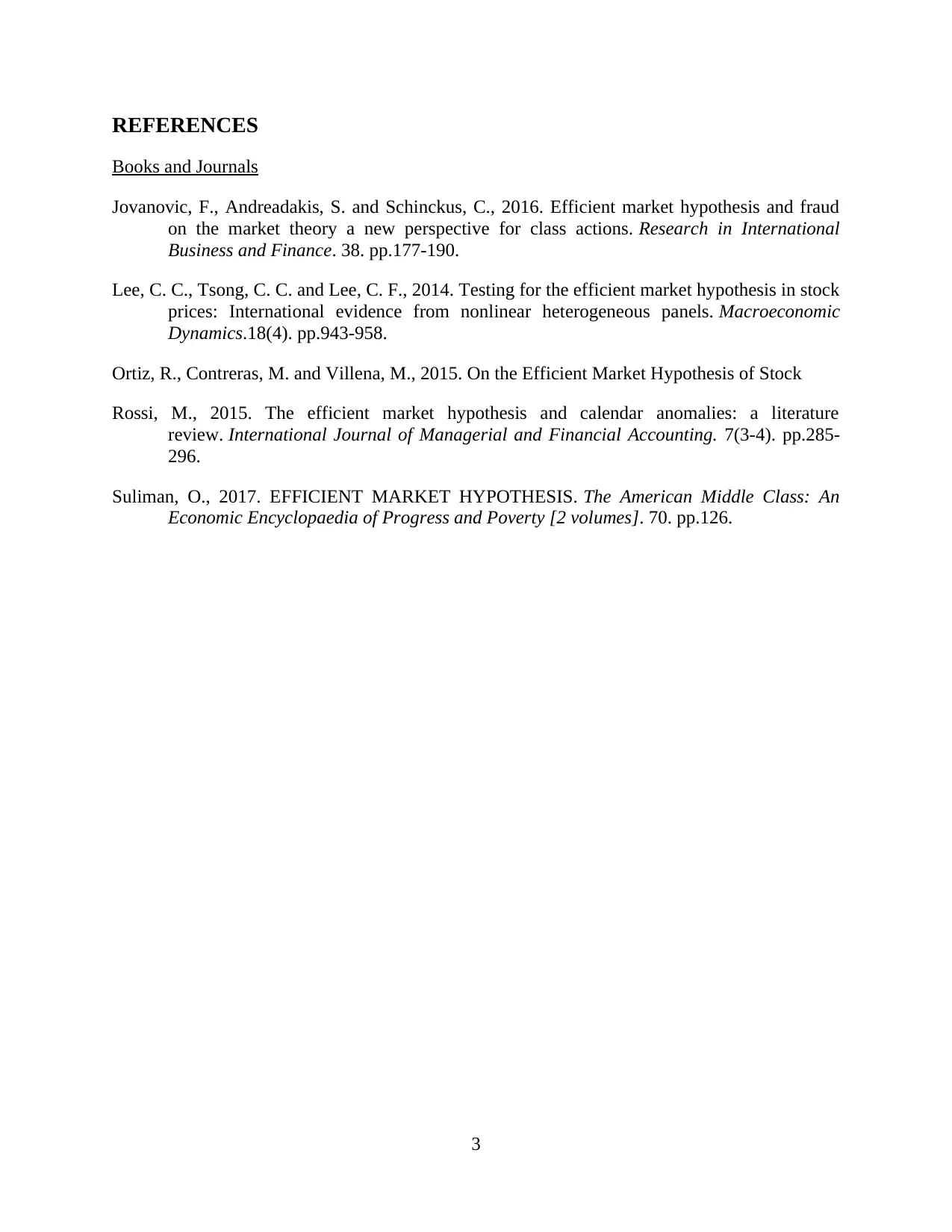Analysis of Domino's Pizza Financial Performance and Market Trends
VerifiedAdded on 2020/07/23
|6
|1026
|124
Report
AI Summary
This report provides a comprehensive financial analysis of Domino's Pizza, examining its performance on the Australian Securities Exchange (ASX). Despite increased net profits, the company's stock price has declined, attributed to issues such as wage fraud and the need to meet market expectations. The report applies the Efficient Market Hypothesis to explain the market's reaction, discussing the impact of factors like market efficiency, investor behavior, and dividend payments. It analyzes the company's strategies, including reducing the number of franchisees, and assesses how these impact the company's market position. The analysis concludes that Domino's should focus on investor confidence and market conditions to improve its stock value. The report references several academic sources to support its analysis and conclusions, providing a detailed overview of Domino's financial challenges and strategic responses within the context of financial theory.

Accounting
Paraphrase This Document
Need a fresh take? Get an instant paraphrase of this document with our AI Paraphraser

TABLE OF CONTENTS
SUMMARY (PART A)...................................................................................................................1
ACCOUNTING THEORY (PART B)............................................................................................1
ANALYSIS (PART C)....................................................................................................................2
CONCLUSION................................................................................................................................3
REFERENCES................................................................................................................................4
SUMMARY (PART A)...................................................................................................................1
ACCOUNTING THEORY (PART B)............................................................................................1
ANALYSIS (PART C)....................................................................................................................2
CONCLUSION................................................................................................................................3
REFERENCES................................................................................................................................4

SUMMARY (PART A)
In the present context, balance sheet of Domino's Pizza enterprise is showing good results
but shares of enterprise are constantly diminishing in Australian Securities Exchange (ASX). As
enterprise, is able to increase its net profit to 31% but unable to control the decline in its stock
prices. Enterprise is unable to meet the market expectations as certain signs of unethical
behaviour have been identified in the organisation. The issue of wage fraud has been identified
and company begin reducing its franchisees. Managing director and CEO have removed four
franchisees and recovered $4.5 million from unpaid superannuation and wages which is 0.8% of
labour costs. Fewer franchises will own and operate more stores which assist in the increment of
share price of company.
ACCOUNTING THEORY (PART B)
According to Rossi (2015) Efficient Market Hypothesis is an idea which says that it is
impossible to beat the market. Stock market efficiency which is already incorporate and shows
closely connected information which makes impossible to beat the market. Efficient market
hypothesis suggest that stock market always deal on their fair value on securities exchanges,
making unbearable for people who want to invest in stock markets As per Suliman (2017), the
theory has faced lots of hostility, especially from technical analyst. The theory expands and
limits the instinct in field of finance simultaneously. Every time company issues its shares in
public, it becomes a game of chance, if they buy or sell the share of company and not a skill.
The diverse form of theory assumes that present share totally shows all public and private
information (Lee, Tsong and Lee, 2014). No one is allowed monopolistic access to closely
related information which contains vital data, market and non-market which is implied in stock
prices.
ANALYSIS (PART C)
As per the article, Domino’s Pizza, is unable to perform efficiently on Australian
Securities Exchange, as the company’s share volume has been dropped to 14.36% which was 12
month lowest and share per price dropped to $53.56. As the enterprise, able to soar profit of
$59.7 million in its hotspot area, but unable to meet the market expectations. The earnings before
interest, taxes, depreciation and amortisation (EBITDA) has raised to 99.7% in European
1
In the present context, balance sheet of Domino's Pizza enterprise is showing good results
but shares of enterprise are constantly diminishing in Australian Securities Exchange (ASX). As
enterprise, is able to increase its net profit to 31% but unable to control the decline in its stock
prices. Enterprise is unable to meet the market expectations as certain signs of unethical
behaviour have been identified in the organisation. The issue of wage fraud has been identified
and company begin reducing its franchisees. Managing director and CEO have removed four
franchisees and recovered $4.5 million from unpaid superannuation and wages which is 0.8% of
labour costs. Fewer franchises will own and operate more stores which assist in the increment of
share price of company.
ACCOUNTING THEORY (PART B)
According to Rossi (2015) Efficient Market Hypothesis is an idea which says that it is
impossible to beat the market. Stock market efficiency which is already incorporate and shows
closely connected information which makes impossible to beat the market. Efficient market
hypothesis suggest that stock market always deal on their fair value on securities exchanges,
making unbearable for people who want to invest in stock markets As per Suliman (2017), the
theory has faced lots of hostility, especially from technical analyst. The theory expands and
limits the instinct in field of finance simultaneously. Every time company issues its shares in
public, it becomes a game of chance, if they buy or sell the share of company and not a skill.
The diverse form of theory assumes that present share totally shows all public and private
information (Lee, Tsong and Lee, 2014). No one is allowed monopolistic access to closely
related information which contains vital data, market and non-market which is implied in stock
prices.
ANALYSIS (PART C)
As per the article, Domino’s Pizza, is unable to perform efficiently on Australian
Securities Exchange, as the company’s share volume has been dropped to 14.36% which was 12
month lowest and share per price dropped to $53.56. As the enterprise, able to soar profit of
$59.7 million in its hotspot area, but unable to meet the market expectations. The earnings before
interest, taxes, depreciation and amortisation (EBITDA) has raised to 99.7% in European
1
⊘ This is a preview!⊘
Do you want full access?
Subscribe today to unlock all pages.

Trusted by 1+ million students worldwide

markets. The sales graph rises to 17.4% in Australia and New Zealand. The company is facing
issue of wage fraud, because of which enterprise’s officials began squeezing the franchisees
which resulted in recovery of $4.5 million of unpaid superannuation and wages. Domino's CEO
also decided to pay shareholders an interim dividend of 48.4% up 39.5%. According to Efficient
Market Hypothesis, shares of Domino's fell because securities market efficiency Of the
organisation is not efficient and shareholders fear in investing in the enterprise. As per the
theory, it is impossible to beat the market because of volatility and change in tastes and
preferences of consumers. Domino's is able to generate efficient net profits but performs poorly
on securities exchange of Australia. According to efficient market hypothesis theory, shares
consistently trade on their fair value on securities exchange making it difficult for investors and
shareholders to either purchase or sell shares in volatile markets (Ortiz, Contreras and Villena,
2015). Enterprise believes that fewer franchisees results increasing in ethical practice, which
enables them to eliminate the issue of fraudulent wage practices in the enterprise. Proponents of
theory conclude that because of instability in markets, company can increase its share value by
allowing investors to make them invest in a low cost and submissive portfolio. Domino's made
decision to pay shareholders an interim dividend. This is related with the theory as enterprise will
only be able to pay dividends if their share value rises. The new stores and reduction in number
of franchisees assist enterprise to improve its market condition in security exchange of Australia
(Jovanovic, Andreadakis and Schinckus, 2016). Efficient Market Hypothesis proposed that stock
prices changes rapidly if new stores opened by enterprise. This will affect the investors and they
tend to invest in company which is generating substantial amount of profit.
CONCLUSION
As per the analysis made, it is concluded that to increase the value of stock, Domino's,
should focus on market condition and beliefs of investors and shareholders who purchase their
shares. It has also been assessed that share per price and interim dividend provided to
shareholders can be raised after applying efficient market hypothesis theory.
2
issue of wage fraud, because of which enterprise’s officials began squeezing the franchisees
which resulted in recovery of $4.5 million of unpaid superannuation and wages. Domino's CEO
also decided to pay shareholders an interim dividend of 48.4% up 39.5%. According to Efficient
Market Hypothesis, shares of Domino's fell because securities market efficiency Of the
organisation is not efficient and shareholders fear in investing in the enterprise. As per the
theory, it is impossible to beat the market because of volatility and change in tastes and
preferences of consumers. Domino's is able to generate efficient net profits but performs poorly
on securities exchange of Australia. According to efficient market hypothesis theory, shares
consistently trade on their fair value on securities exchange making it difficult for investors and
shareholders to either purchase or sell shares in volatile markets (Ortiz, Contreras and Villena,
2015). Enterprise believes that fewer franchisees results increasing in ethical practice, which
enables them to eliminate the issue of fraudulent wage practices in the enterprise. Proponents of
theory conclude that because of instability in markets, company can increase its share value by
allowing investors to make them invest in a low cost and submissive portfolio. Domino's made
decision to pay shareholders an interim dividend. This is related with the theory as enterprise will
only be able to pay dividends if their share value rises. The new stores and reduction in number
of franchisees assist enterprise to improve its market condition in security exchange of Australia
(Jovanovic, Andreadakis and Schinckus, 2016). Efficient Market Hypothesis proposed that stock
prices changes rapidly if new stores opened by enterprise. This will affect the investors and they
tend to invest in company which is generating substantial amount of profit.
CONCLUSION
As per the analysis made, it is concluded that to increase the value of stock, Domino's,
should focus on market condition and beliefs of investors and shareholders who purchase their
shares. It has also been assessed that share per price and interim dividend provided to
shareholders can be raised after applying efficient market hypothesis theory.
2
Paraphrase This Document
Need a fresh take? Get an instant paraphrase of this document with our AI Paraphraser

REFERENCES
Books and Journals
Jovanovic, F., Andreadakis, S. and Schinckus, C., 2016. Efficient market hypothesis and fraud
on the market theory a new perspective for class actions. Research in International
Business and Finance. 38. pp.177-190.
Lee, C. C., Tsong, C. C. and Lee, C. F., 2014. Testing for the efficient market hypothesis in stock
prices: International evidence from nonlinear heterogeneous panels. Macroeconomic
Dynamics.18(4). pp.943-958.
Ortiz, R., Contreras, M. and Villena, M., 2015. On the Efficient Market Hypothesis of Stock
Rossi, M., 2015. The efficient market hypothesis and calendar anomalies: a literature
review. International Journal of Managerial and Financial Accounting. 7(3-4). pp.285-
296.
Suliman, O., 2017. EFFICIENT MARKET HYPOTHESIS. The American Middle Class: An
Economic Encyclopaedia of Progress and Poverty [2 volumes]. 70. pp.126.
3
Books and Journals
Jovanovic, F., Andreadakis, S. and Schinckus, C., 2016. Efficient market hypothesis and fraud
on the market theory a new perspective for class actions. Research in International
Business and Finance. 38. pp.177-190.
Lee, C. C., Tsong, C. C. and Lee, C. F., 2014. Testing for the efficient market hypothesis in stock
prices: International evidence from nonlinear heterogeneous panels. Macroeconomic
Dynamics.18(4). pp.943-958.
Ortiz, R., Contreras, M. and Villena, M., 2015. On the Efficient Market Hypothesis of Stock
Rossi, M., 2015. The efficient market hypothesis and calendar anomalies: a literature
review. International Journal of Managerial and Financial Accounting. 7(3-4). pp.285-
296.
Suliman, O., 2017. EFFICIENT MARKET HYPOTHESIS. The American Middle Class: An
Economic Encyclopaedia of Progress and Poverty [2 volumes]. 70. pp.126.
3

4
⊘ This is a preview!⊘
Do you want full access?
Subscribe today to unlock all pages.

Trusted by 1+ million students worldwide
1 out of 6